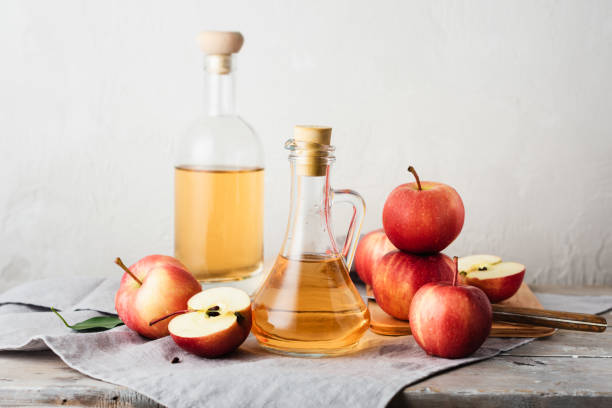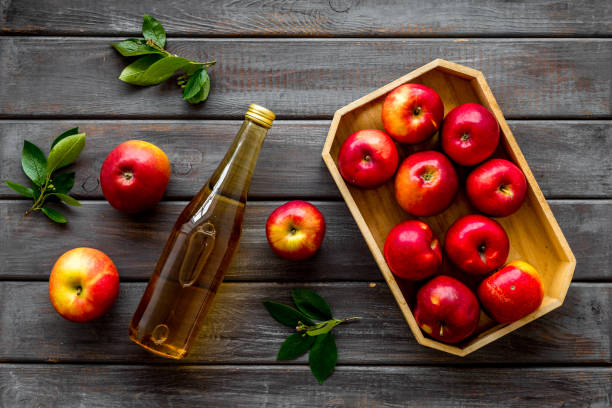The Secret Ingredient: Unleashing the Potential of Apple Cider Vinegar in Cooking
Hey there, fellow food enthusiasts! Today, we're about to embark on a culinary journey that might just change the way you look at one humble kitchen staple – apple cider vinegar (ACV). Sure, you might have used it in salads or dressings before, but did you know that this tangy elixir holds a treasure trove of potential in the world of cooking? Let's dive in and uncover the secrets of this versatile ingredient.

The ABCs of ACV: Understanding Apple Cider Vinegar
First things first, what exactly is apple cider vinegar? Well, it's made from fermented apple juice, giving it that distinctive fruity aroma and tangy flavour. Unlike its refined counterpart, apple cider vinegar retains the "mother" – a colony of beneficial bacteria and enzymes that pack a punch when it comes to health benefits.
Raw, unfiltered ACV with the "mother" intact is the best choice for cooking, as it contains more nutrients and flavour.
ACV is rich in acetic acid, which gives it its characteristic sour taste and makes it a versatile ingredient in the kitchen.
Enhancing Flavours: How ACV Elevates Your Dishes
Now, let's talk about taste. ACV isn't just about adding acidity to your dishes; it's about enhancing flavours in ways you never thought possible. A splash of ACV in soups, stews, or sauces can brighten up the entire dish, balancing out richness and adding depth.
Use ACV to add a tangy kick to marinades, dressings, and sauces.
Incorporate ACV into braised dishes to cut through the richness and add a refreshing zing.
Tenderizing Meats: The Magic of Marinating with ACV
Ever wondered how to achieve that perfectly tender meat? Look no further than apple cider vinegar. Thanks to its acidic nature, ACV works wonders as a marinade, breaking down tough fibres and infusing your meat with subtle sweetness. Simply marinate your protein of choice in a mixture of ACV, herbs, and spices for a few hours, and voilà – tender, flavourful perfection awaits
ACV helps to tenderize meat by breaking down connective tissues, resulting in a juicier and more tender texture.
Combine ACV with olive oil, garlic, and herbs for a simple yet effective marinade for poultry, pork, or beef.
Baking Brilliance: ACV in Sweet Treats
Who said apple cider vinegar is only for savoury dishes? When it comes to baking, ACV can be your secret weapon for achieving light and fluffy cakes, muffins, and pancakes. Its acidity reacts with baking soda to create bubbles, resulting in a beautifully risen bake without any residual vinegar taste. Plus, it adds a subtle tanginess that cuts through sweetness, elevating your treats to new heights.
Replace eggs in vegan baking recipes with a mixture of ACV and baking soda for leavening and moisture.
Add a splash of ACV to pie crust dough for a flakier texture and enhanced flavour.
Healthy Swaps: Using ACV as a Substitute
Looking to cut down on unhealthy ingredients without sacrificing flavour? ACV to the rescue! Swap out creamy dressings and sauces for a lighter alternative by incorporating ACV into your recipes. You'll slash calories and fat while still enjoying that tangy goodness – talk about a win situation.
Substitute ACV for mayonnaise or sour cream in coleslaw or potato salad for a lighter, tangier dressing.
Use ACV in place of lemon juice in recipes to add acidity and brightness to dishes.

Preserving Perfection: ACV in Pickling
If you've ever dabbled in the art of pickling, you'll know that vinegar plays a crucial role in preserving your favourite fruits and veggies. Enter apple cider vinegar, with its mild acidity and subtle sweetness, making it the perfect pickling agent. From crunchy cucumbers to fiery jalapeños, ACV adds a unique flavour profile that'll have you reaching for that jar time and time again.
Create a simple pickling brine with equal parts ACV and water, plus sugar, salt, and spices to taste.
Use ACV to pickle a variety of vegetables, from carrots and radishes to onions and cauliflower, for a tangy addition to sandwiches and salads.
Boosting Digestion and Health Benefits of ACV
Beyond its culinary applications, apple cider vinegar is renowned for its potential health benefits. Incorporating ACV into your cooking not only enhances flavour but also provides a range of digestive and wellness perks.
ACV contains probiotics that promote gut health and aid in digestion.
Some studies suggest that ACV may help regulate blood sugar levels and promote weight loss when consumed as part of a healthy diet.
Sustainability and CostEffectiveness of ACV
When it comes to pantry staples, apple cider vinegar shines as a sustainable and cost effective option. With its long shelf life and myriad uses, ACV offers bang for your buck while reducing food waste.
ACV is often more affordable than other specialty vinegars, making it a budget friendly choice for home cooks.
By using ACV in cooking and preserving, you can extend the shelf life of fresh produce and reduce the need for store bought condiments and preservatives.
Exploring Culinary Creativity with ACV
Finally, don't be afraid to get creative with ACV in the kitchen! Experiment with different flavour combinations and cooking techniques to unlock the full potential of this versatile ingredient.
Use ACV as a base for homemade vinaigrettes, sauces, and marinades, customising the flavours to suit your taste preferences.
Incorporate ACV into cocktails and mocktails for a refreshing twist on classic drinks, or drizzle it over fresh fruit for a simple yet elegant dessert.

Conclusion
Apple cider vinegar isn't just a condiment – it's a culinary powerhouse waiting to be unleashed in your kitchen. From enhancing flavours to tenderising meats and even preserving your favourite produce, the possibilities are endless. So, the next time you're whipping up a meal, don't forget to reach for that bottle of ACV and let its magic take your dishes to new heights.
FAQs About Apple Cider Vinegar in Cooking
Q: Can I use any type of apple cider vinegar for cooking?
A: While any variety of ACV will work, opt for raw, unfiltered versions with the "mother" intact for maximum flavour and health benefits.
Q: Will my dish taste like vinegar if I use ACV?
A: Not at all! When used in moderation, ACV adds a subtle tanginess to your dishes without overpowering other flavours.
Q: Can I substitute other types of vinegar for ACV?
A: In most cases, yes. However, keep in mind that each type of vinegar has its own distinct flavour profile, so adjust quantities accordingly.